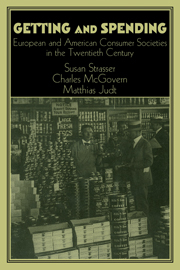Book contents
- Frontmatter
- Introduction
- Part One Politics, Markets, and the State
- 1 The Consumers' White Label Campaign of the National Consumers' League, 1898-1918
- 2 Consumption and Citizenship in the United States, 1900-1940
- 3 Changing Consumption Regimes in Europe, 1930-1970: Comparative Perspectives on the Distribution Problem
- 4 Customer Research as Public Relations: General Motors in the 1930s
- 5 The New Deal State and the Making of Citizen Consumers
- 6 Consumer Spending as State Project: Yesterday's Solutions and Today's Problems
- 7 The Emigré as Celebrant of American Consumer Culture: George Katona and Ernest Dichter
- 8 Dissolution of the “Dictatorship over Needs”?: Consumer Behavior and Economic Reform in East Germany in the 1960s
- Part Two Everyday Life
- Part Three History and Theory
- Index
7 - The Emigré as Celebrant of American Consumer Culture: George Katona and Ernest Dichter
Published online by Cambridge University Press: 05 January 2013
- Frontmatter
- Introduction
- Part One Politics, Markets, and the State
- 1 The Consumers' White Label Campaign of the National Consumers' League, 1898-1918
- 2 Consumption and Citizenship in the United States, 1900-1940
- 3 Changing Consumption Regimes in Europe, 1930-1970: Comparative Perspectives on the Distribution Problem
- 4 Customer Research as Public Relations: General Motors in the 1930s
- 5 The New Deal State and the Making of Citizen Consumers
- 6 Consumer Spending as State Project: Yesterday's Solutions and Today's Problems
- 7 The Emigré as Celebrant of American Consumer Culture: George Katona and Ernest Dichter
- 8 Dissolution of the “Dictatorship over Needs”?: Consumer Behavior and Economic Reform in East Germany in the 1960s
- Part Two Everyday Life
- Part Three History and Theory
- Index
Summary
With its adaptation of Marxism and its emphasis on the role of the mass media, the Frankfurt School has provided the most widely recognized analysis of consumer culture to come out of Europe in the 1930s and influence Americans in subsequent decades. Beginning in the 1940s, George Katona and Ernest Dichter celebrated what many leading emigre intellectuals were critiquing: the impact of consumer culture on American life. Katona (1901-81) relied on his surveys of consumer expectations carried out at the University of Michigan from 1946 to 1972 to assert that the optimistic and sensible American consumer would heroically prevent the nation from experiencing the inflation and instability that ravaged Europe in the years between the two world wars. Dichter (1907-91) made a handsome living in the United States helping corporations understand the psyche of consumers. In the process, he linked democracy with purchasing, redefined the roles of middle-class women, and promoted a distinctly antipuritanical vision.
Although the pictures drawn by Katona and Dichter of the American consumer differed in many respects, they shared a belief, shaped by their experiences in Europe and the United States, that American consumers were critical to the promotion of growth, democracy, and stability. They both gave a special importance in their analysis to the new middle class of salaried and professional employees and to the leadership of educated experts, social and behavioral scientists especially, as forces that would prevent fascism from coming to America.
- Type
- Chapter
- Information
- Getting and SpendingEuropean and American Consumer Societies in the Twentieth Century, pp. 149 - 166Publisher: Cambridge University PressPrint publication year: 1998
- 20
- Cited by



